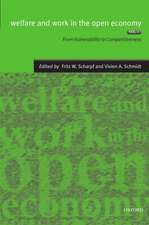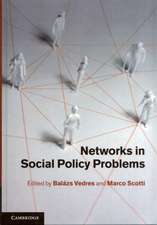Resilient Liberalism in Europe's Political Economy: Contemporary European Politics
Editat de Vivien A. Schmidt, Mark Thatcheren Limba Engleză Paperback – 28 aug 2013
| Toate formatele și edițiile | Preț | Express |
|---|---|---|
| Paperback (1) | 298.43 lei 6-8 săpt. | |
| Cambridge University Press – 28 aug 2013 | 298.43 lei 6-8 săpt. | |
| Hardback (1) | 627.18 lei 6-8 săpt. | |
| Cambridge University Press – 28 aug 2013 | 627.18 lei 6-8 săpt. |
Preț: 298.43 lei
Nou
Puncte Express: 448
Preț estimativ în valută:
57.11€ • 61.06$ • 47.61£
57.11€ • 61.06$ • 47.61£
Carte tipărită la comandă
Livrare economică 17 aprilie-01 mai
Preluare comenzi: 021 569.72.76
Specificații
ISBN-13: 9781107613973
ISBN-10: 1107613973
Pagini: 469
Ilustrații: 6 b/w illus. 5 tables
Dimensiuni: 152 x 226 x 21 mm
Greutate: 0.7 kg
Ediția:New.
Editura: Cambridge University Press
Colecția Cambridge University Press
Seria Contemporary European Politics
Locul publicării:New York, United States
ISBN-10: 1107613973
Pagini: 469
Ilustrații: 6 b/w illus. 5 tables
Dimensiuni: 152 x 226 x 21 mm
Greutate: 0.7 kg
Ediția:New.
Editura: Cambridge University Press
Colecția Cambridge University Press
Seria Contemporary European Politics
Locul publicării:New York, United States
Cuprins
Preface; 1. Theorizing ideational continuity: the resilience of neo-liberal ideas in Europe Vivien A. Schmidt and Mark Thatcher; Part I. Economy, State, and Society: 2. Neo-liberalism and fiscal conservatism Andrew Gamble; 3. Welfare-state transformations: from neo-liberalism to liberal neo-welfarism? Maurizio Ferrera; 4. The state: the bête noire of neo-liberalism or its greatest conquest? Vivien A. Schmidt and Cornelia Woll; Part II. Neo-liberalism in Major Policy Domains: 5. The collapse of the Brussels-Frankfurt consensus and the future of the euro Erik Jones; 6. Supranational neo-liberalization: the EU's regulatory model of economic markets Mark Thatcher; 7. Resilient neo-liberalism in European financial regulation Daniel Mügge; 8. Neo-liberalism and the working class hero: from organized to flexible labour markets Cathie Jo Martin; 9. European corporate governance: is there an alternative to neo-liberalism? Sigurt Vitols; Part III. Neo-liberalism in Comparative Perspective: 10. The resilience of Anglo-liberalism in the absence of growth: the UK and Irish cases Colin Hay and Nicola J. Smith; 11. Germany and Sweden in the crisis: re-coordination or resilient liberalism? Gerhard Schnyder and Gregory Jackson; 12. State transformation in Italy and France: technocratic versus political leadership on the road from non-liberalism to neo-liberalism Elisabetta Gualmini and Vivien A. Schmidt; 13. Reassessing the neo-liberal development model in Central and Eastern Europe Mitchell A. Orenstein; Part IV. Conclusion: 14. Conclusion: explaining the resilience of neo-liberalism and possible pathways out Mark Thatcher and Vivien A. Schmidt.
Recenzii
'Given the abject failure of neo-liberalism's latest policy offering - austerity - to promote growth in Europe, why are neo-liberal ideas and policies still the only game in town? The answer to such a simple question involves multiple threads of explanation, linking powerful interests to ideational plasticity, and institutional stickiness. Schmidt, Thatcher, and their collaborators have delivered a volume that gives us powerful answers to these pressing questions.' Mark Blyth, author of Austerity: The History of a Dangerous Idea
'Neo-liberalism persists, paradoxically, as a dominant approach to European policymaking despite mountains of evidence showing that it fails to deliver on its promises. In Resilient Liberalism in Europe's Political Economy an outstanding team of social scientists explains this paradox by showing how neo-liberalism's malleability, partial implementation, discursive and institutional advantages and powerful supporters have frustrated most efforts to sweep it aside. In doing so they provide lessons about how we might defend against neo-liberalism in the future …' John L. Campbell, Class of 1925 Professor, Dartmouth College, and Professor of Political Economy, Copenhagen Business School
'The neo-liberal trust in efficient markets has failed dramatically in the present crises, but the paradigm still seems to shape economic and social policies in Europe. The contributors to this volume have documented the resilience of neo-liberal beliefs and practices in a range of crucial policy fields and they succeed in explaining specific policy trajectories within a common frame of reference. Intellectually exciting and immensely enlightening.' Fritz W. Scharpf, Director Emeritus, Max Planck Institute for the Study of Societies, Cologne
'The major contribution made by this volume, then, is not the rigid definition of an ideology, but the identification of particular traits of Anglophone capitalism that have spread under a particular moniker … any scholar working in analysis of modern political economy would do well to study this volume. It contains many insights that are cogent with topical debates.' Greg Barnes, Journal of Common Market Studies
'Neo-liberalism persists, paradoxically, as a dominant approach to European policymaking despite mountains of evidence showing that it fails to deliver on its promises. In Resilient Liberalism in Europe's Political Economy an outstanding team of social scientists explains this paradox by showing how neo-liberalism's malleability, partial implementation, discursive and institutional advantages and powerful supporters have frustrated most efforts to sweep it aside. In doing so they provide lessons about how we might defend against neo-liberalism in the future …' John L. Campbell, Class of 1925 Professor, Dartmouth College, and Professor of Political Economy, Copenhagen Business School
'The neo-liberal trust in efficient markets has failed dramatically in the present crises, but the paradigm still seems to shape economic and social policies in Europe. The contributors to this volume have documented the resilience of neo-liberal beliefs and practices in a range of crucial policy fields and they succeed in explaining specific policy trajectories within a common frame of reference. Intellectually exciting and immensely enlightening.' Fritz W. Scharpf, Director Emeritus, Max Planck Institute for the Study of Societies, Cologne
'The major contribution made by this volume, then, is not the rigid definition of an ideology, but the identification of particular traits of Anglophone capitalism that have spread under a particular moniker … any scholar working in analysis of modern political economy would do well to study this volume. It contains many insights that are cogent with topical debates.' Greg Barnes, Journal of Common Market Studies
Descriere
This book explains why neoliberal economic ideas have not just survived, but thrived since the 1980s - taking Europe from boom to bust.


























